#Mel Dahl
Explore tagged Tumblr posts
Text



Gene Wilder - Willy Wonka & the Chocolate Factory (1971)
#gene wilder gif#willy wonka and the chocolate factory gif#70s fantasy movies#70s musicals#mel stuart#roald dahl#70s movies#seventies#1971#gif#chronoscaph gif
238 notes
·
View notes
Text
Willy Wonka & the Chocolate Factory (1971)
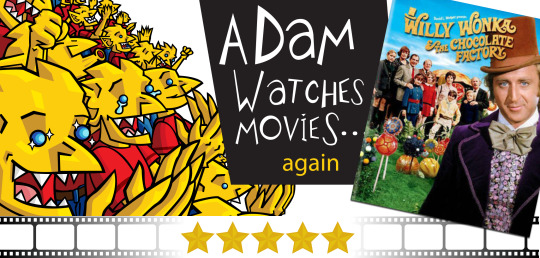
In 2005, Tim Burton directed an adaptation of Charlie and the Chocolate Factory. It was generally well-reviewed and made nearly $500 million at the box office. I’ll call it a good film. Watching 1971's Willy Wonka & the Chocolate Factory, you can understand why someone felt like it could use a remake/the book needed to be adapted again. That said, the artistic decisions at the writing, musical, performance and tonal level accompany all of the weird “of the era” choices. Combined, they make this movie the kind that transcends the decades.
Poor, kind Charlie Bucket (Peter Ostrum) lives in a small house with his mother (Diana Sowle) and his four grandparents. One day, legendary candy maker Willy Wonka (Gene Wilder) announces he has hidden five golden tickets in his world-famous Wonka Bars. The children who find them will be allowed access to his mysterious factory and receive a lifetime supply of chocolate. As the world madly scrambles to find the golden tickets, Charlie continues to believe he has a chance of finding one too.

The premise implies it, but Charlie does eventually find one of the golden tickets and he invites his beloved Grandpa Joe (Jack Albertson) to join him on the factory tour. I’m still labeling this fact as a spoiler because it’s about a third to halfway through the movie before Charlie finds his golden ticket. A sizeable chunk of the running time is dedicated to showing our hero as kind, good-hearted and full of hope despite his circumstances, while the other people who find the tickets… are exactly who you think they would be. The film teases you and builds the anticipation. Charlie is poor. He has to scratch together the money needed to buy a single Wonka bar while some of his classmates open over a hundred. There’s a cruelty to the fact that any other year, a single bar for his birthday would be the most wonderful thing Charlie could’ve dreamed of but this year, the bar is a disappointment because it doesn't contain a shiny invitation. You want Charlie to see the inside of that factory because you like him and you know what it would mean to the boy. It’s equally important that he finds one because everyone else who's going doesn’t deserve to go like he does.
Until we get to the factory, director Mel Stuart frequently cuts to gags showing us the extent of the globe's Wonkamania. Scientists have developed machines to find tickets without opening the wrappers. As the worldwide supply begins to dry up, sealed boxes of Wonka bars are sold at auction houses for ridiculous sums. We even see a woman whose husband has been kidnapped hesitating to pay the ransom: her stash of Wonka bars.
Is it a surprise that the children who find the Golden Tickets are all loathsome in their own ways? There’s the gluttonous Augustus Gloop (Michael Böllner). He loves chocolate but just looking at him constantly stuffing his face makes you feel a little ill. Next is Veruca Salt (Julie Dawn Cole). She got her ticket because her father bought millions of bars and dedicated the entire staff of his peanut factory to rip the packaging open until they found it. She's the definition of "spoiled". The last two children, chronic gum-chewer Violet Beauregarde (Denise Nickerson), and television-obsessed Mike Teevee (Paris Themmen) are brats consumed by their bad habits. I guess there’s nothing THAT bad about chewing gum the way Violet does (though her obsession is pretty gross) or the way Mike obsesses over his shows (boy does his rotten attitude make him detestable, however) but they both give you a headache. There’s something pretty funny about the fact that some of these kids’ “deadly sins” are so juvenile and you’re happy to see all of them taught a lesson.
The odd thing about Willy Wonka and the Chocolate Factory is that there aren’t any character arcs. The bad children are taught lessons but in the process, they leave the factory tour and the movie. Charlie is already the person he’s meant to be so what the film does is introduce him and the world outside the factory, introduce the other children, then whittle down the cast as we explore the chocolate-making process and get to know Willy Wonka. That’s an unusual structure but it suits the film well. We anticipate the inevitable even before realizing their lessons come with musical numbers.
The competition for which piece of music is the best is fierce. Despite going on to become a hit after its rendition by Sammy Davis, Jr. and fitting in the movie perfectly, I don’t think The Candy Man is as memorable as (I've Got a) Golden Ticket but is the latter’s ability to stick in your mind due to the music & lyrics, or because of the scene that introduces it? The real contenders are Pure Imagination and the Oompa Loompa song, which gets my vote. It’s got an iconic melody, memorable lyrics and has the added bonus of being easy to expand upon or parody. It’s another reason to look forward to the bad kids misbehaving.

There’s a lot to say about Willy Wonka and the Chocolate Factory. Visually, it’s not as slick as it could be and there are times when it’s so strange (that scary tunnel ride) that you can understand why someone said “We should try this again”. The thing is, the strange choices aren’t bugs; they’re features. Yes, it is occasionally unexpectedly weird/scary but if the movie was nothing but sweet songs and bright-eyed children learning nice lessons, it wouldn’t be any fun. The moments when Willy Wonka is a little bit nasty towards his bratty guests mirrors the way you feel about them. The release of 2023's Wonka only makes the film's evergreen quality more apparent. (November 29, 2024)
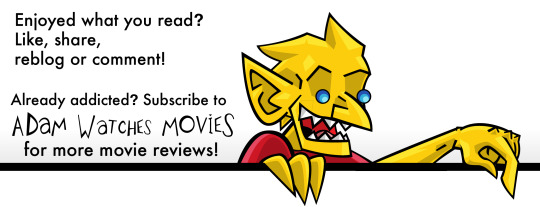
#willy wonka & the chocolate factory#charlie and the chocolate factory#movies#films#movie reviews#film reviews#Mel Stuart#Roald Dahl#Gene Wilder#Jack Albertson#Peter Ostrum#Roy Kinnear#Denise Nickerson#Leonard Stone#Julie Dawn Cole#Paris Themmen#Dodo Denney#1971 movies#1971 films#Wonka
5 notes
·
View notes
Text

Die hier im Zusammenhang mit Wonka angekündigte gravierende cineastischen Bildungslücke, sollte den wirklich aufmerksamen Internettagebuchleser eigentlich gar nicht so verwundern wie angekündigt, weil ich sie hier schon erwähnt habe, da in Vorbereitung für das damals neue Musical: Nämlich, daß ich noch nie Willy Wonka and the Chocolate Factory mit Gene Wilder angeschaut habe. Was mich als notorischen Verfechter von Leslie-Bricusse-&-Anthony-Newley-Kindermusicals sogar selber etwas wunderte, aber irgendwie war ich immer etwas misstrauisch. Aber jetzt, und die erwarteten Lieder, kommen alle (obwohl es mir jetzt scheint, als seien es die falschen...), es ist angemessen verschroben und Gene Wilder ist natürlich ganz entzückend (der Bub auch), die Hauptirritation für hiesige Anglophile besteht aber irgendwie darin, daß das Haus der Buckets und Willy Wonkas Schokoladenfabrik sich so offensichtlich in München befinden. Dies ist jetzt Teil vergleichender Studien mit allen Willy-Wonka-Verfilmungen, die aber aber vorhersehbarerweise wohl damit enden wird, daß uns das Bühnenmusical am besten gefallen hat.
#Willy Wonka and the Chocolate Factory#Gene Wilder#Peter Ostrum#Roy Kinnear#Film gesehen#Mel Stuart#Musical#Leslie Bricusse#Anthony Newley#Roald Dahl#Charlie and the Chocolate Factory
5 notes
·
View notes
Text
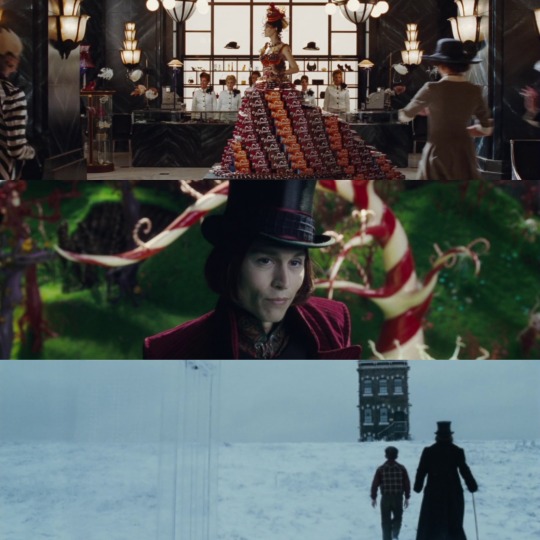
Charlie and the Chocolate Factory (2005, Tim Burton)
29/03/2024
Charlie and the Chocolate Factory is a 2005 film directed by Tim Burton.
The film stars Johnny Depp and is based on the novel of the same name by Roald Dahl.
Another adaptation had previously been made from the book in 1971, Willy Wonka and the Chocolate Factory, by Mel Stuart, with Gene Wilder, from whom, however, Burton said he did not take inspiration for his, instead trying to return to the spirit original of Dahl's novel.
Charlie Bucket is a poor child who lives with his family, consisting of his parents, his paternal grandparents George and Georgina and his maternal grandparents Joe and Josephine.
One evening grandfather Joe tells Charlie that, years before, he worked in the first shop opened by the man who would become the most famous sweets maker in the world, the enigmatic Willy Wonka. Unfortunately, Wonka's rivals, envious of his sweets and success, sent spies to steal his secret recipes, to the point that Willy Wonka was forced to close the factory, firing his employees.
One day Willy Wonka makes an announcement that shocks the whole world: whoever finds five golden tickets hidden in as many chocolate bars produced by him, which could be found anywhere in the world, will have the opportunity to visit his grandiose factory, and one of the five visitors will win a special prize. As soon as the news spreads, the sweet shops are stormed and, after a short time, the first four tickets are found by four children: Augustus Gloop, from Düsseldorf, Germany, greedy and obese; Veruca Salt, from Buckinghamshire, England, a capricious and spoiled little girl by her rich father; Violet Beauregarde, from Atlanta, Georgia, a vain and arrogant little girl, world bubble gum champion and winner of numerous awards; Mike Teavee from Denver, Colorado, a very intelligent and grumpy child addicted to television and video games.
During the tour of the factory, a series of flashbacks reveal Willy Wonka's past: he was the son of the uncompromising dentist Wilbur Wonka, who made him wear enormous orthodontic braces and didn't allow him even the smallest sweet. One Halloween night, after his father had thrown the sweets he had collected into the fire, little Willy secretly managed to retrieve and eat a chocolate. After closing the factory due to recipe thefts, he decided to reopen it having found new and loyal workers among the indigenous Oompa-Loompas.
During the tour inside the factory, unlike Charlie, the other four children turn out to be unpleasant and disobedient and are involved in various events due to which they leave the scene one after the other: Augustus falls into a river of chocolate from which he was trying to drink and is sucked into a tube that collects the chocolate and takes it to the various departments; Violet tries an experimental chewing gum on herself and swells, transforming into a huge blueberry; Veruca is attacked and thrown into the garbage dump by a group of squirrels trained to shell nets, after trying to catch one; Mike gets teleported by a machine to transfer Wonka Bars to the television and becomes very small.
Charlie Bucket, played by Freddie Highmore.
Willy Wonka, played by Johnny Depp.
Mr. and Mrs. Bucket, played by Noah Taylor and Helena Bonham Carter.
#charlie and the chocolate factory#film#2005#tim burton#johnny depp#roald dahl#1971#willy wonka and the chocolate factory#mel stuart#gene wilder#List of Charlie and the Chocolate Factory characters#willy wonka#Industrial espionage#Wonka Bar#dusseldorf#germany#buckinghamshire#england#atlanta#georgia#chewing gum#denver#colorado#flashback#halloween#Umpa Lumpa#teleportation#television#freddie highmore#noah taylor
6 notes
·
View notes
Text
Day Three: Elsa Dahl





Category: 2G/Generation 0
Elsa Dahl! My beloved counterpart to Astrid. Elsa is the gloomy one. She's the dark cloud to Astrid's sun. If it's not clear, I ship these two ladies. I ship them hard.
Elsa was, unfortunately, the firstborn of Lars Dahl. She never knew her mother, as soon after giving birth, Hilda Dahl perished in a severe house fire. It's not suspicious when it happens once, but when Elsa's sister Thea was born, the same tragic circumstance occurred once more. At this point, the people in Undredal, Norway, were getting PRETTY suspicious. Lars ended up moving himself and his two young daughters to Ephraim, Wisconsin to escape possible law enforcement. However, old habits die hard. Lars killed his third child's mother in the same fashion. This time, though... A little girl sent in a tip to the authorities. Before Lars could be arrested, he mysteriously perished in a house fire, and his three children were sent to foster care.
No one really wanted the Dahl kids. Elsa was mean and standoffish, untrusting and argumentative. Thea and Vilhelm were both just flat out freaky. And to be fair, none of them have really changed that much.
When Elsa was 18, she became her siblings' legal guardians and paraded the ragged bunch to a homeless shelter.
Once the Swarm hit, Elsa took her siblings and escaped -- though she did try to ditch them. Several times. She doesn't "like" her siblings. But they eventually came to HQ and settled there.
Elsa hates people and she hates being bothered by people. She keeps to herself and to her cigarettes, using cruelty to retain her constant state of me-time. She loves plants and animals, though, and often tends to the indoor garden when no one else is around.
Elsa is my Atheist demiromantic asexual lesbian QUEEN 👸 and she and Astrid will kiss mark my words
#here we go agaaaaiin#im excited to talk about thea tomorrow...#it is also important to note that elsa is the cousin of myrkur#who is one of the strange little children astrid keeps trying to adopt#myrkur belongs to my pookie mel tho#bluubbles art#ocs#oc art#digital art#my ocs#Daily OC#Elsa Dahl#2G#gen0
0 notes
Text

Roald Dahl, September 13, 1916 – November 23, 1990.
With Gene Wilder and Peter Ostrum during the making of Mel Stuart’s Willy Wonka & the Chocolate Factory (1971).
32 notes
·
View notes
Text
Birthdays 9.13
Beer Birthdays
Jan Léonardus Moortgat (1841)
Lorenzo Dabove (1952)
The Hamm's Bear (1952)
Fred Matt (1959)
Dan Gordon (1960)
Mrs. Brookston Beer Bulletin (1971)
Diane & Elaine Klimaszewski (a.k.a. "The Coors Light Twins;" 1971)
Mikkel Borg Bjergsø (1975)
Five Favorite Birthdays
Fiona Apple; rock singer (1977)
Peter Cetera; rock singer, bassist (1944)
David Clayton-Thomas; rock singer (1941)
Mike Grell; comic book artist, writer (1947)
Judith "Miss Manners" Martin; advice columnist (1938)
Famous Birthdays
Sherwood Anderson; writer (1876)
Barbara Bain; actor (1931)
Jacqueline Bisset; actor (1944)
Don Bluth; animator (1937)
Charles Brown; blues singer, pianist (1922)
Jan Brueghel the Younger; Flemish artist (1601)
Nell Carter; actor (1944)
Claudette Colbert; actor (1903)
Roald Dahl; Welsh writer (1916)
Alain Ducasse; chef (1956)
Leonard Feather; jazz pianist, journalist (1914)
Girolamo Frescobaldi; composer (1583)
Anne Geddes; Australian photographer (1956)
Dick Haymes; singer (1918)
Milton Hershey; chocolatier (1857)
Robert Indiana; artist (1928)
Maurice Jarre; composer (1924)
Randy Jones; pop singer, Village People "cowboy" (1952)
Richard Kiel; actor (1939)
Frank Marshall; film director (1946)
Bill Monroe; bluegrass musician (1911)
Dave Mustaine; rock guitarist (1961)
Tyler Perry; actor, film director (1969)
John J. Pershing; army general (1860)
J.B. Priestly; English writer (1894)
Walter Reed; army surgeon (1851)
Arnold Schoenberg; composer (1874)
Clara Schumann; composer, pianist (1819)
Scooby-Doo; cartoon character (1969)
Jean Smart; actor (1951)
Mel Torme; jazz singer (1925)
Don Was; rock musician, record producer (1952)
2 notes
·
View notes
Text
A Mothers Day Message from your local incest shipper to all followers
Happy Mother's Day
In honor of this coporate sponsored holliday, I want to wish you all the best. If you have a good relationship with your mom, Best Wishes to the both of you! If you have a bad relationship with her, Best to you and nothing to your mom. And if YOU'RE a mother, well, I hope this post entertains you, and that you recognise that it is in fun. (This blog celebrates fictional incest.)
But If you're MY mother?🤨 GET OFF MY BLOG!!
But for all of us with Mommy issues - I'm linking all my Mom x Daughter Fanfics. My mom doesn't get to read these, but you do.
(This is how my sense of humor works guys, you'll have to live with it.)
All fics have parent x child relationships (may include by adoption or multiverse.) Most are short. See word counts and tags.
Title: Tangent to the Main Bagel Plotline - They Fucked
Words: 314
Fandom: Everything Everywhere All at Once
Relationship: Evelyn Wang / Joy Wang | Jobu Tupaki
Tags: explicit, oneshot, fisting
“Right is a tiny box invented by people who are afraid.” - Jobu Tupaki, Everything Everywhere All at Once
Title: cry like a wounded animal
words: 838
Fandom: Arcane
Relationship: Ambessa Medarda / Mel Madarda
tags: explicit, oneshot, cunnalingus
"Gods forbid her mother ever make anything easy for Mel - even losing."
Title: Olympus
Words: 848
Fandom: Arcane
Relationship: Ambessa Medarda / Mel Madarda (gen)
Tags: teen and up, subtext
"a debutant can't escape her own ball; an artist can't escape her own gallery show."
Title: Let Us Dare (originally published 2014)
Words: 3,621
Fandom: Matilda (1996), Matilda - Roald Dahl
tags: teen and up, aged up characters, future fic, science fiction
"Let us be brave enough..."
Title: The Power of Hidden Emotions (originally published 2014, and rewrite of 2004 work)
Words: 11,814 (completish- read authors notes)
Fandom: Matilda (1996), Matilda - Roald Dahl
Relationship: Jennifer Honey / Matilda Wormood
tags: mature, aged up characters, underage(teen), magic made them do it
"For the first time in her life, Matilda doubted the experimental method."
I hope you enjoyed one or two of these short (so short wow lol) works of smut and silliness. Comment (on AO3 please) if you enjoyed or leave a reply if you appreciate my sense of humor for sharing these today.
7 notes
·
View notes
Text
Eavesdropping at the Movies: 407 – Wonka
Listen on the players above, Apple Podcasts, Audible, Google Podcasts, or Spotify. Paul King, the director of Paddington and Paddington 2, brings us Wonka, another reimagining of a British children’s classic. Roald Dahl’s beloved 1964 novel, Charlie and the Chocolate Factory, has been adapted twice: once in 2005 by Tim Burton, but most memorably in 1971 by Mel Stuart, with Gene Wilder as…

View On WordPress
#Calah Lane#Charlie and the Chocolate Factory#Comedy#fantasy#Hugh Grant#Musical#Olivia Colman#Paul King#Roald Dahl#Timothée Chalamet#Tom Davis#Willy Wonka and the Chocolate Factory#Wonka
0 notes
Text
First Take: Wonka - the unexpected prequel that gets the Dahl style perfect
SYNOPSIS: With dreams of opening a shop in a city renowned for its chocolate, a young and poor Willy Wonka discovers that the industry is run by a cartel of greedy chocolatiers.
The last time I seen the name Paul King attached to a film, it was when a certain Peruvian bear won over the hearts of British cinemagoers (and Nicolas Cage) with his sequel back in 2017 and becoming a mainstay of the BBC Christmas schedule ever since. Fast forward six years, and now the entire creative team who made the iconic Paddington films for StudioCanal have been entrusted with a biggie: the prequel to Willy Wonka and the Chocolate Factory. Any fears the purists had about this project went away instantly, as this is a worthy spritual successor/prequel to the beloved book.
youtube
King continues to make the style of film he's known for, even with Warner and the Dahl company keeping a close eye on him - wholesome family adventures that have heart, soul, and elements of darkness which feel editorially justified, and much like Roald Dahl's source material, there is plenty of that in the 1 hour 56 minutes, especially as it blends ideas and imagery from the 1971 Mel Stuart/Gene Wilder film and Tim Burton's 2005 reboot, while at the same time creating an origin story that feels truthful to the style of the original book, which King and co-writer Simon Farnaby absolutely nail. Chung-hoon Chung acts as the film's DOP (with Seamus McGarvey beginning the shoot and leaving halfway through) and does an incredible job behind the camera for a musical film of this nature, and speaking of the music, Joby Talbot's score hits all the right places, with his former bandmate - Neil Hannon of The Divine Comedy - writing the original songs (and a few new bits for an iconic number which closes the film) to create a musical which could easily do Greatest Showman kinds of numbers if this opening week is anything to go by.
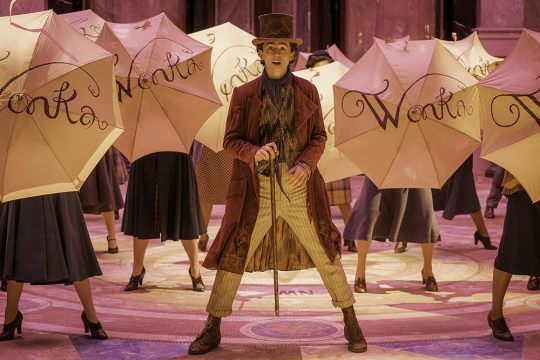
With the performances, everyone wrote him off when he was cast - but my god, Timothee Chalamet is inspired casting. He can sing, he can dance, he can carry a film, and with his next project being Dune: Part 2, is there anything that Twitter (sorry, X)'s favourite actor can't do? He is ably supported by a frankly immense cast - Olivia Colman, Tom Davis, Keegan-Michael Key, Matt Lucas, Paterson Joseph, Matthew Baynton, Sally Hawkins, Rowan Atkinson, and the breakout talent Calah Lane rounding it all out. But just as he did the last time he worked with Paul King, one actor is a complete scenestealer- Hugh Grant as an Oompa-Loompa. Sounds so wrong but it is so well justified. A word to the wise though - don't leave until the very end, as there is one little moment he sets up during the credit roll - one which potentially teases more Dahl projects getting the Hollywood treatment.
THE VERDICT
This film's been described as a warm hug by many, and much like King's previous work, Wonka will go down incredibly well with the mainstream audiences. It's a nice and safe PG that caters to all, and on top of that, it packs an emotional punch for fans of the 71 version, the 2005 version or the musical - it is truly Wonka for this generation.
RATING: 4.5/5
0 notes
Text
Review: Wonka is eccentric, musical and boring
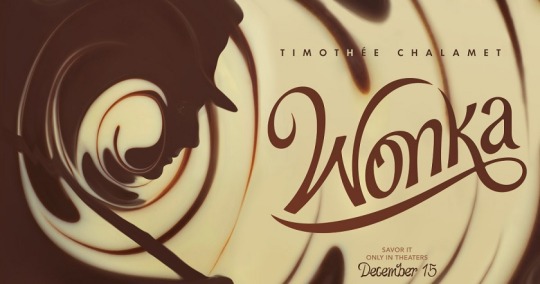
Literature has played a very important role in the entertainment industry, novels have been adapted to films and these to successful sagas, these works have several varied themes ranging from children's to fantasy and more current themes. We could list the authors who have seen their material in real action on a movie screen, one of them has been the British writer Roald Dahl (1916 - 1990) who has delighted children and adults for generations with his works that include James and the Giant Peach (1961), Charlie and the Chocolate Factory (1964), Fantastic Mr. Fox (1970), Charlie and the Great Glass Elevator (1972), The Witches (1983), Matilda (1988) among others. One of his most popular works is undoubtedly Charlie and the Chocolate Factory, which has had 2 film adaptations, the first titled Willy Wonka & the Chocolate Factory (1971) by director Mel Stuart, Charlie & the Chocolate Factory (2005) by director Tim Burton and the animated film Tom and Jerry: Willy Wonka and the Chocolate Factory (2017) by director Spike Brandt as well as a Broadway musical Charlie & the Chocolate Factory: The musical (2017) with songs composed by Marc Shaiman and Scott Wittman. The fantastic story of an eccentric chocolatier returns to the big screen in 2023, director Paul King's Wonka is a modernized film of this literary classic.
What is the film about?
Willy Wonka (Timothée Chalamet) tells the wonderful story of how the greatest inventor, magician, businessman, traveler, and chocolatier became the beloved Willy Wonka we know today, full of ideas and determined to change the world, this enthusiastic young man is ready to prove that the best things in life begin with a dream and it doesn't matter what you have to do to fulfill it. Willy Wonka as a literary character is, by the standards we use today, strange and eccentric, the latter may be timeless, but the truth is that the versions that Gene Wilder and Johnny Deep already embodied at the time have been very different in their context and concept, while one was happier the other was more sinister, the story is the same, a successful chocolate factory that no one can enter and a humble child wins a golden ticket to know the mysteries and secrets that this factory hides. Wonka intends to go further not to the future of the character but to his past so that we can know the origins of how he was able to found that empire based on delicious chocolate, the creators and screenwriters Simon Farnaby and Paul King take too many liberties in wanting to give him a different twist and that in turn can connect with the novel and even the film productions that precede it, this may seem like a good idea and the difficult thing is to give it shape and make it believable within how fantastic it may be that a project like this can work. With multiverses being so fashionable, we dare to say that this is part of something that is but is not within a previously established canon, one that has imposed its own rules and one of them is precisely that everything is independent. There is no relationship. In any of them, it is difficult for us to believe that Timothée Chalamet's Wonka could be the adults, Wilder and Deep, there is simply no connection. The film as a project experiments a lot with exaggerated fantasy and the excessive use of CGI, which although it recreates environments and characters that do not exist is very attractive, the color palette, as well as its photography, becomes impressive at times, and the visual quality is very novel and perhaps it is the only thing that can contribute because on the one hand, we have this and on the other its history and its subplots, that perverse game of us being the spectators having to deduce what is happening with these 2 things is an area of comfort that we have already talked about on many occasions in other reviews. Paul King labels his new film as a traditional and commercial film production but as a visual spectacle. During the opening titles, he describes himself as a musical and adventure film that tries to give a message and fit into the modernity of this century with the new generations and the possibility of it becoming a successful franchise, which is very far from becoming.
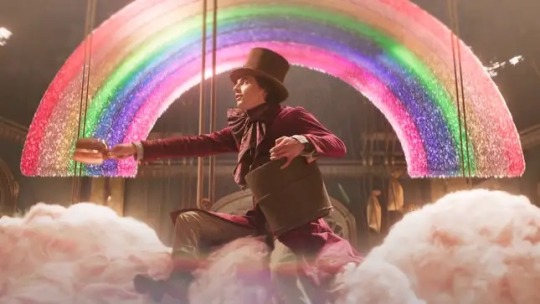
We agree that there are things that do not need a sequel or a prequel, nor do they need to be modernized and be politically correct and inclusive, it is evident that the lack of ideas in Hollywood has led its writers to search through what by is and to pretend that a successful product can be born from this, this is already a constant problem that is becoming more and more accentuated and that is losing more audience, not to mention the serious financial problems that the main and large studios have today. His story completely lacks a factor that can pleasantly surprise us, this is because many or few, locals and strangers, already know what this young Wonka is going to transform into, who here is an aspiring chocolatier who already dominates to the point of being able to make magic, to prove himself he arrives in a fictitious European city to compete with the most elegant and respected chocolate manufacturers in the world, what he has in his favor is his incredible creativity to mix flavors to the rhythm of catchy songs that end up being a nuisance. The film has a clear line of how to circulate within its narrative but is not clear about where it wants to go, during the first 10 minutes and with an immediately ingratiating song that talks about his hopes and dreams and how to achieve them, however, The film goes from being fantastic to delving into the world of the chocolate mafia as if it were a drug cartel, among which are the respected Mr. Prodnose (Matt Lucas), Mr. Fickelgruber (Matthew Baynton) and Mr. Slugworth ( Paterson Joseph) who compete to dominate this business and the market in general where they will not allow anyone else, much less an asshole, to succeed with a chocolate that makes customers fly in a unique experience. Doomed to failure and public ridicule and harassed by his corrupt police chief (Keegan-Michael Key), Willy struggles to fulfill his dream. It is evident and predictable that this becomes a problem and even more so when he meets Mrs. Scrubbit (Olivia Colman), a landlady who uses her boarding contracts to turn visitors into slaves, it is there where she meets a girl named Noodle (Calah Lane) with whom she will form a friendly alliance and who, together with her creations, will manage to buy her freedom. After many unnecessary songs and a dose of unfinished action, we well know that he will neither remain a slave nor fail to realize his dream, come on, we already know Willy Wonka, be it Wilder or Deep or even the literary character, what they intend here is to make us believe that all of this does not exist yet and is going to be forged in future films, something that I still believe is not possible but hey, anything can happen in that fantasy world but not in real life. As for what is visually recreated, we cannot complain, the production design by Nathan Crowley and costume designer Lindy Hemming created a world so fantastic and believable that only Wonka could imagine. The recreation of the town square is a strange mix of classic European architectural influences with modern touches. Each setting we see, from the elegant chocolate shop to the Cartel's elaborate lairs, is designed with great care and detail that amazes us as spectators. of the most important point that is its history.

Its biggest flaw is the script, there is too much wasted plot apparently to justify a prequel to a perfect children's/youth story, focusing on that is leaving aside the direction it wants and should take, the subplots are extremely strange and without much sense, its conclusion is guessable and nothing surprising, he befriends this girl, frees her and adopts her, but we are leaving aside one of the key characters in these stories, the famous and hard-working Lofty (Hugh Grant) represents the Oompa Loompas and how that friendship/work that we saw very briefly in the previous films is forged. Musically, Wonka has original songs written by Neil Hannon that contain some samples of the well-known Pure Imagination and Oompa Loompa that shamelessly advocate nostalgia but that in their execution become a nuisance that interrupts at every moment the development of everything else including that of their characters. The film wastes too much time with the songs in which each one tries to carry the message of celebrating the power of imagination and the beauty of dreaming big, that friendship and love for what one does is everything to obtain the desired success, of finding a place in the world and the importance of remaining faithful to one's vision, principles and values regardless of the obstacles, that chocolate no matter what it is is delicious, the theme of friendship cannot be missing that everything can and the politically correct inclusion with this African American girl who despite her condition has everything to succeed, a moral and trite discourse that is more embedded here than in other productions. The cast is made up of Timothée Chalamet, Calah Lane, Keegan-Michael Key, Paterson Joseph, Matt Lucas, Mathew Baynton, Sally Hawkins, Jim Carter, Tom Davis, Olivia Colman, Rowan Atkinson, Hugh Grant who do much more than is required, faced with this multi-star cast, their characters along with their development fall too short, if we have actors and actresses of this level at least we must offer a good script in which each one can have their fair share of time and that does not happen and is surely due because they continue with this model of continuing to tell things in future installments and I insist, I don't think that will ever happen. The score composed by Joby Talbot desperately tries to keep up with the film's rhythm, the few pieces desperately try to convey some emotion and fantasy in each scene and fail to do so, which is a shame, there are very redeemable pieces that are lost and They are diluted in the edition. In conclusion, if you think that this film will give too many revelations and details about Willy Wonka's past, it is not exactly what it is interested in telling, it is not risky, it is not original, and it is not something that contributes to the genre beyond the technical, It is just a visually entertaining experiment that is completely unnecessary in current cinematography, it is a pretext for Warner studios to remain moderately valid during this Christmas season in which, after a pandemic, returning to theaters is the goal to obtain profits regardless of that the product they present is very questionable. Wonka is already out in theaters in your country. https://www.youtube.com/watch?v=otNh9bTjXWg Read the full article
1 note
·
View note
Text
'The last of the specials, “Wild Blue Yonder”, ended on quite the cliff-hanger with our Fourteenth Doctor (David Tennant) and companion Donna Noble (Catherine Tate) warned that the world is coming to its end by the legendary Wilfred Mott, played by the late Bernard Cribbins.
What follows is an exciting nearing sixty-minute epic that dives deep into the history of the Doctor, all while brewing up to a fantastic debut for the Fifteenth Doctor, played by Ncuti Gatwa. Not to mention the grand return of the Toymaker, here played by the incredible Neil Patrick Harris...
THE TOYMAKER IS BACK
The 60th Anniversary Specials have long been known to be home to one of the Doctor’s most iconic villains from the classic era – The Toymaker. A powerful being from his own realm, the Toymaker is back in the Doctor’s universe to cause chaos with his games.
While we don’t know why that is until the special leaps into action with our Doctor and Donna duo running to save the day, the Fourteenth Doctor notes that the Toymaker has managed to leave his realm of existence because of the salt the Doctor cast at the edge of the universe back in the previous special. This enabled the elemental force of the Toymaker into our universe, bringing his giggles along the way.
The Toymaker is featured in this special’s cold open, with one of John Logie Baird’s assistants coming to his Soho emporium in 1925 to buy a doll. This doll, bought and sold to no longer be with his doll family (yes, you heard that) is later used during Baird’s first televised demonstration, of which burns the doll’s face into something evermore so creepy.
Following our creepy cold open, we find that the reason for everyone going mad is because they all believe they’re right. It’s as if everyone has been blasted by a laser ray gun that turns everyone into Harry Wormwood from Road Dahl’s Matilda. His quote to his adopted kid Matilda – “I’m right and you’re wrong, I’m big and you’re small, and there’s nothing you can do about it.” – pretty much sums up humanity’s motives throughout this special.
After managing to get Wilfred to safety, we find our Fourteenth Doctor and Donna being transported to UNIT’s new headquarters, that of an Avengers Tower rip-off if I ever saw one. Jemma Redgrave returns as UNIT’s chief scientific officer Kate Stewart, with returning Doctor companion Mel Bush (Bonnie Langford) now working with the taskforce.
UNIT’s answer to this madness is through these bracelet-type devices called the Zeedex, created by the Vlinx, a robotic alien assisting UNIT. Kate manages to disable her bracelet to show-off just what we’re dealing with this special.
HUMANITY IS BREAKING THEMSELVES APART
A lot of the motives behind the Toymaker’s meddling with humanity stem from the Toymaker’s own fascination with us. He loves how complex but simple we are, how online the world is nowadays, and how we don’t like to be wrong. While the show often portrays evil aliens as antagonists, this last special instead is a mirror to humanity. We’re the villain of the week, even if we’re being pulled by the strings of the Toymaker.
The special depicts news montages with those affected by the giggle, with the UK Prime Minister saying how little he cares for his people, and a far-right spokeswoman issuing her anti-Zeedex remarks to her viewers. Davies sure knows how to creatively spice his specials with underlying political messages in quite an imaginative way. And who would want anything less than the very King of Doctor Who himself.
Wasting no time, we find the Doctor heading to face the Toymaker back in 1925 with Donna at her side. Encountering the Toymaker in his emporium, the pair chase after the powerful being into the back, finding themselves in an endless corridor (not another one!). This allows for some tension to loosen amongst Tennant’s Doctor and Catherine’s Donna, with them being there for each other once more as great friends.
This chase for the Toymaker doesn’t last long, however, with the pair seated for one of his puppet shows once they escaped the many doors throughout that pesky corridor. What follows is a tongue-in-cheek breakdown of the many fates some of the Doctor’s companions have had, from Amy Pond all the way to Bill Potts.
The Doctor has had ENOUGH at this point, and invites the Toymaker to play a game – one of the many things the Toymaker specialises in, outside of impressive dance scenes to the Spice Girls of course. They play cards, one of the oldest games ever, but unfortunately the Toymaker wins. You’d think all hope is lost but the Doctor recants how he won previously against him, referencing the game he played with him back in 1966’s “The Celestial Toymaker” with the First Doctor. The Toymaker, of course, suggests a best of three, taking the game back to 2023 for a winner takes all.
Both Doctor and Donna mark their way back to UNIT headquarters, but before this next game can take place, the Toymaker manages to cause further chaos at UNIT HQ, with a violent dance scene to the Spice Girls’ song Spice Up Your Life. You can tell Russell T Davies saw the Master’s Rasputin montage in the Power of the Doctor and went “Oh I like that”, and put his own creative spin to it. RIP to those UNIT soldiers turned into balloons; the Toymaker would be sure to give Pennywise a run for his money.
THE FINAL SHOWDOWN
Up on the UNIT helicopter landing pad, we have our final showdown between the Toymaker and that of the Doctor, joined by UNIT and Donna. Did anyone else get goosebumps or was it just me? Anyways, before the final game between the pair, we see our Fourteenth Doctor try to defuse the situation by offering the Toymaker to join him across time and space.
Infinite games amongst the cosmos sounds like a sweet ride, but for the Toymaker, humanity is his ultimate playground. Using UNIT’s galvanic beam, he shoots the Doctor fatally, giving way for an all-too-memorable regeneration sequence for the Doctor.
And then everything changes. The concept of regeneration, that of Doctor Who’s most fascinating way to recast its titular character, has been altered in quite the way. Expecting to change his face one more time, David Tennant’s Doctor utters ‘Allons-y’ before realising something isn’t quite right. He tells Mel and Donna to pull at his arms, which splits the Doctor into two – the 14th and the 15th.
Ncuti Gatwa’s Fifteenth Doctor makes his fantastic debut, albeit still conjoined to his 14th-self. Billed as a myth according to the 15h Doctor, bi-generation allows for both Doctors to co-exist. In quite the Davies-twist, this definitely twisted around the concept of regeneration in a way that was quite fresh for the show.
With the also-freshly-made Fifteenth Doctor here to support the Fourteenth & co, both Doctors play a game of ball with the Toymaker to finish him off once and for all. They win, and the Toymaker is sealed away from the universe for good, but not before alluding to his ‘legions’ already on their way for the Doctor.
I didn’t think I’d be saying this, but all’s well that end’s well in this Doctor Who special, with UNIT Headquarters at peace following this final battle. We do get to see someone with some pretty cutely red-painted nails take the Toymaker’s remaining gold tooth however, of which the Toymaker said to be containing the Master earlier on in the special. Davies sure is setting up his next era of Doctor Who for Ncuti Gatwa’s Fifteenth Doctor already, and it’s not been ten minutes since we’ve had him!
It doesn’t take much for questions to arise after this showdown however, with the pair of Doctors still only sharing one TARDIS. Using some leftover energy from the Toymaker’s domain, the Fifteenth Doctor literally throws his mallet to the TARDIS, causing it to duplicate. Turns out, even the TARDIS can bi-generate too in a way. This allows for both Doctors to have their own TARDIS, and co-exist freely without the other.
ALL’S WELL THAT ENDS WELL
With the Fifteenth Doctor already excited for his own adventures, the special has been clueing into the psyche of the Fourteenth Doctor’s mentality throughout the special with how he has been shouldering all this pain from his past adventures which have been a bit too much for himself. Instead of throwing himself to more adventures too soon, David Tennant’s Fourteenth Doctor settles down for a bit with the Noble family, enjoying a meal with everyone and his former companion, Melanie Bush.
It’s not often you see a happy ending in Doctor Who, especially for the show’s titular Doctor, but the Fourteenth Doctor certainly got his, and truly earnt it. Before we cut to Gatwa’s’ Doctor ready to take off in his TARIDS, we end on the Fourteenth Doctor saying how he’s “never been so happy in [his] life”. Okay, if the waterworks didn’t already start earlier in this special, they definitely started now.
But what’s next for both Doctors? Well, we already know showrunner Russell T. Davies is leading the way with Ncuti Gatwa’s Fifteenth Doctor for his first series next year, but who knows when we’ll next see the Fourteenth. This ending truly opens the door to many new exciting stories and tales for both Doctors, and that’s exactly what you love to see as a whovian...'
#The Giggle#Wild Blue Yonder#Doctor Who#60th Anniversary#David Tennant#Ncuti Gatwa#Neil Patrick Harris#The Toymaker#Catherine Tate#Donna Noble#UNIT#Kate Stewart#Wilfred Mott#Bernard Cribbins#Melanie Bush#Bonnie Langford#Russell T. Davies#John Logie Baird#Bi-generation
0 notes
Text
Action Figures ReAction Willy Wonka e A Fantástica Fábrica de Chocolate (1971)
A Super7 anunciou sua primeira coleção de action figures ReAction com personagens do clássico filme A Fantástica Fábrica de Chocolate, dirigido por Mel Stuart em 1971 e baseado no livro escrito por Roald Dahl. A coleção Willy Wonka & the Chocolate Factory ReAction Figures Wave 1 tem três action figures estilo retrô e escala 3.75” com 5 pontos de articulação cada e 9,5 cm de altura. As figuras vêm…

View On WordPress
0 notes
Link
WONKA Trailer - Film Inquiry Paul King (Paddington) is bringing us t... #movie quote #movies #movie line #movie line #movie scenes #cinema #movie stills #film quotes #film edit #vintage #movie scenes #love quotes #life quotes #positive quotes #vintage #retro #quote #quotes #sayings #cinematography
0 notes
Text
Mel Dahl - Friend of Dorothy
Homosexual activity has been has been a reason to be discharged from the US military since the Revolutionary War. As the USA prepared to enter World War II, the military, in addition to its regular efforts to find gay, lesbian and bisexual service members and boot them from service, added processes to try to identify “homosexual” recruits and prevent them from joining,
During his campaign for the presidency, Bill Clinton pledged to lift the ban on gay troops, but faced opposition from senior military personnel and powerful Congressional leaders.
The compromise they reached and implemented in 1994 was the “Don’t Ask, Don’t Tell” policy, which meant the military wouldn’t actively search for gay, lesbian or bisexual personnel nor ask about a person’s sexual orientation, but if the military discovered someone is LGB, they could be discharged. Thus as long as the LGB individual didn’t share about their personal life at work or with military colleagues while off base, they should be able to serve. A truly imperfect and problematic policy, but a step forward.
This “Don’t Ask, Don’t Tell” policy remained in effect for 17 years, until being repealed by Pres. Obama. Openly gay, lesbian and bisexual people have been allowed to serve in the US armed forces since the repeal.
—————————
When Mel Dahl enrolled in the Navy in 1980, a military doctor asked the standard question of whether he’s gay, and Mel admitted he was. He completed basic training and applied for clearance to be a cryptographer. As part of that process, he again was asked if he is gay and his truthfulness got him a dishonorable discharge.
He fought his discharge in court, even walking coast-to-coast in 1981 to publicize his case. It took 13 years of court battles, but in 1994 a judge finally ruled his dismissal unconstitutional and the Navy agreed to pay him 4 year’s worth of back wages. During the media interest early in the legal battle, Mel told a reporter that a great many gay men served at the Great Lakes Naval Training Center where he was stationed.
A witch hunt for gay sailors at the Great Lakes base ensued. The Naval Intelligence Service launched a full-scale investigation to identify a presumably massive homosexual network. They followed Mel Dahl and would secretly go through his possessions trying to find clues.
Naval intelligence discovered and infiltrated a gay Christian group that tried to worship weekly on base and everyone who was participating was discharged.
The Navy sent investigators to gay bars in the Chicago area to discover gay sailors. Investigators were paid to pose as gay men, to drink and dance and introduce themselves to other patrons, trying to identify who might be in the military.
During these trips to the gay bars, they noticed that many gay men identified themselves as “a friend of Dorothy.” The Intelligence Service figured that “Dorothy” must be a woman who organized a city-wide ring of gay servicemen. If they could find her, they figured they could “convince” her to talk, perhaps outing many gay navy personnel, who with a little pressure could be persuaded to identify many other gay men in the Navy so they all could be booted out.
The key was to find Dorothy. The NIS sent investigators to the gay bars to ask questions about this mystery woman. At one point, someone managed to convince them that a real-life woman officer named Dorothy was who they were after. She was very religious and anti-gay and this was a way of getting back at her for her bigotry. Spies followed her for months, never finding any associations with gay people, and concluded they had the wrong Dorothy.
They never found Dorothy
—————————
An interesting aside, while this investigation, and many others, focused on gay men, in the late 1980s there was a perception that the military was unfairly not working so hard to discover lesbians in the ranks.
Vice Admiral Joseph S. Donnell sent out a memo urging his subordinates to ferret out lesbians in the Navy. His memo included this helpful tip for identifying lesbians:
“Experience has shown that the stereotypical female homosexual in the Navy is hard-working, career-oriented, willing to put in long hours on the job and among the command’s top professionals.”
Wouldn’t want their kind!
Military records indicate that in the 1990′s, being a woman who was also a member of a naval sports team, like softball or basketball, was enough to get the person onto the “potential lesbian” list, with Naval Intelligence scouting the games and taking pictures of the players to add to their investigation files.
————————————————————
The phrase “Friend of Dorothy” first popped up in the 1940’s, and for many decades was a way for gay people to indicate someone is gay. The “Dorothy” in question is the main character from the Wizard of Oz.
At a time when it was illegal to be gay and society was strongly homophobic, it was handy to have a phrase that allowed gay men to identify themselves to each other without actually saying they’re gay. When meeting another person, the gay man could say, “I’m a friend of Dorothy,” and if the other man were gay, he likely understands exactly what is being said. But if he isn’t gay, he’d probably think the individual thought they had a mutual friend named Dorothy.
Some believe that the phrase is derived from book The Road To Oz (1909), a sequel to the original Wonderful Wizard of Oz. In that book, Polychrome (Oz) says, “You have some queer friends, Dorothy.” She replies, “The queerness doesn’t matter, so long as they’re friends.”
The movie The Wizard of Oz delighted audiences and was so popular that from 1959 until the 1990′s, it was broadcast annually as a television special on American television.
Dorothy’s journey from Kansas to Oz mirrored gay men’s desires to escape the black-and-white limitations of their small-town life for the big, colorful cities.
The Tin Man, The Scarecrow and Cowardly Lion are misfits who don’t conform to the roles society has given them, and yet Dorothy immediately accepts them. The Tin Man is constantly getting emotional and crying and needing to be lubed up. The Scarecrow can’t frighten a crow nor anything else. The Cowardly Lion identifies himself as a “sissy,” says “there’s no denyin’, I’m a dandy lion,” and behaves in a stereotypically effeminate way.
Gay men are often accused of being less masculine than straight men and could see themselves in these characters. Dorothy meeting & accepting them is often interpreted as her meeting & accepting gay men without question. It didn’t matter to Dorothy if others were different, it was their character that mattered.
The phrase “Friend of Dorothy” isn’t nearly as widely known nowadays in the LGBT community thanks to the changes in the law and societal attitudes.
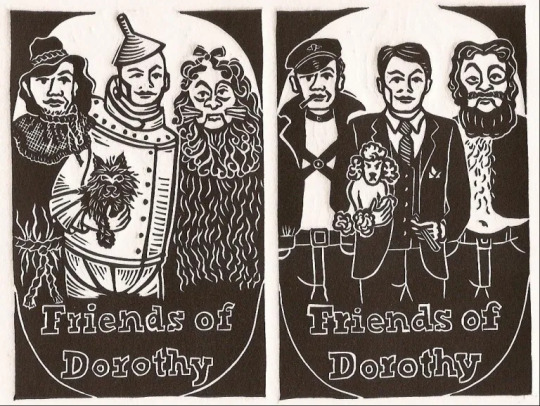
—————————
I learned the British equivalent of “Friend of Dorothy” is “Friend of Mrs. King” (aka, Queen, as in a "gay man"). “Do you know if Nigel is a friend of Mrs. King?”
#Mel Dahl#Friend of Dorothy#hahaha#the US Naval Intelligence Service couldn't crack the simple code#shows how effective it was#gays knew it and straights did not#queer history
59 notes
·
View notes
Photo
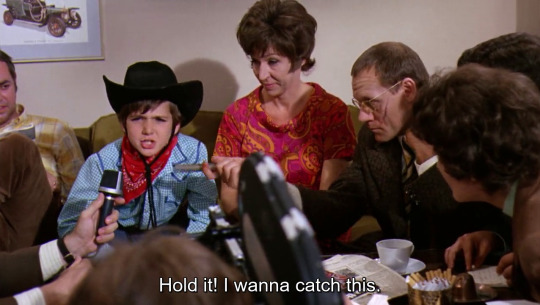

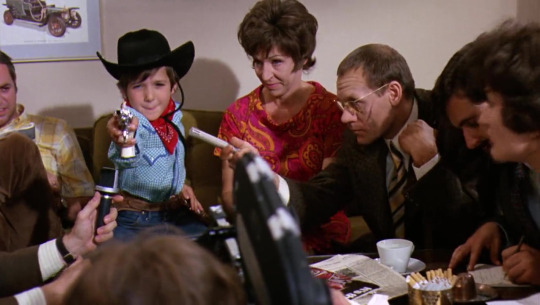


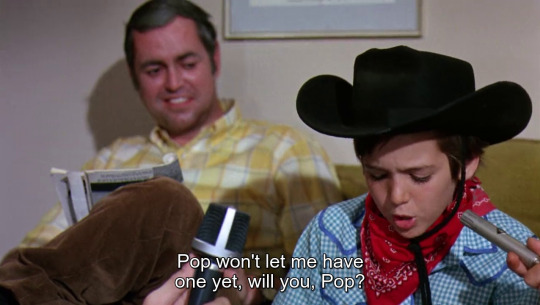
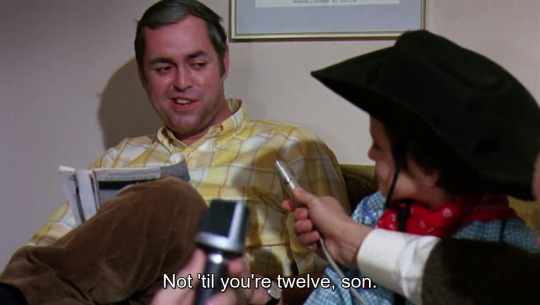

"Not 'til you're twelve, son."
(from Willy Wonka & the Chocolate Facotry, 1971)
#art imitates life#gun culture#gun violence#american dream#willy wonka and the chocolate factory#uvalde#uvalde texas#it really is that common#in america#mike teevee#paris themmen#mel stuart#roald dahl#musical fantasy#chocolate#candy#gene wilder#1971#slugworth#günter meisner#mysterious chocolate factory#dahl hated the film#too saccharine and not enough of a focus on wonka
19 notes
·
View notes